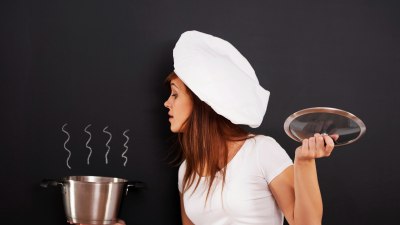Why You Regret Cooking Anything the Second It Heats Up
Explore why cooking often leads to regret as your dish heats up, from unrealistic expectations to practical kitchen pitfalls.

Image by gpointstudio on Freepik
Cooking can be a rewarding activity, offering the promise of a delicious meal made with your own hands. Yet, many people experience an all-too-familiar moment of regret the second their food starts heating up. This sudden feeling of dread or disappointment can happen whether you're reheating leftovers or preparing a fresh dish. But why does this happen? Understanding the root causes behind this common phenomenon can help you manage expectations, improve your cooking experience, and even enjoy the process more.
Unrealistic Expectations About the Outcome
One of the most common reasons for cooking regret at the heating stage relates to expectations. When you begin cooking or reheating food, you often anticipate a perfect taste and texture. However, the reality may fall short. Visualizing the end result as much better than what actually unfolds in the kitchen sets you up for disappointment.
For example, you might imagine your homemade pasta sauce as vibrant, rich, and flavorful, but when heated, the sauce could turn out watery or bland. Likewise, reheating leftovers often leads to uneven textures or loss of moisture, making the food less appetizing than expected. These mismatches between expectation and reality can trigger regret almost instantly as the food starts warming.
The Science of Taste Changes Upon Heating
Another factor behind cooking regret is that heating food alters its taste and smell in ways that can be unintuitive. Certain compounds responsible for flavor change chemically when exposed to heat, sometimes reducing the intensity of desirable aromas or producing off-flavors.
Take reheated seafood or fried foods as an example—they can develop a strange odor or become greasy, which quickly sours the appetite. Heat can also cause proteins to denature or caramelization to happen unevenly, which might make a dish taste different from when it was freshly cooked.
The Reality of Time and Effort Invested
When we regret our cooking as soon as the food heats up, it's often because we are reminded of the time and energy spent preparing the dish. If the warming process reveals imperfections or lackluster flavors, it may feel like all that effort has been wasted.
This sensation is amplified for busy individuals who see cooking as a chore. After a long day, the last thing they want is to feel regret right before a meal. The thought that their precious time could have been saved by eating out or choosing something easier can make the emotional impact sharper.
The Psychological Aspect of Cooking Anxiety
Some people experience anxiety around cooking, which contributes to the feeling of regret when heating food. This anxiety can stem from uncertainty about the outcome, fear of food waste, or social pressures related to meal quality.
As the food heats, a person may mentally scan for anything that seems off—the smell, appearance, or texture—and immediately doubt their decision. This heightened self-criticism breeds regret that emerges instantly, even before tasting the dish.
Tough Textures and Uneven Heating
Technically speaking, certain foods do not reheat well, resulting in tough, rubbery, or dry textures on warming. Proteins like chicken breast or steak can become chewy, while starchy items like rice or pasta may turn mushy or clump together.
Microwaves—commonly used for reheating—tend to heat food unevenly, leaving cold spots alongside hot patches. This inconsistency can negatively impact the sensory experience, making the meal unpleasant and triggering immediate regret.
The Role of Sensory Memory and Habit
Human brains hold strong sensory memories of how food should taste and smell, especially for dishes eaten regularly or prepared with tradition. If the reheated meal does not match these memories, your brain registers a mismatch, resulting in a sensation of disappointment and regret.
Repeated experiences of underwhelming reheated dishes build a habit of negative anticipation, meaning you may dread the heating process even before it starts, reinforcing the cycle of regret.
Food Safety Concerns Heightening Doubts
Another practical reason for regret when food heats up ties to concerns about safety. Improperly stored leftovers, or foods nearing expiration, can cause uneasiness about potential bacterial growth or spoilage.
Even if the food looks fine, subtle doubts can arise when heating food, making you question whether it’s safe to eat. This unease can manifest as instant regret or reluctance to proceed with the meal.
Influence of Social and Cultural Expectations
Social and cultural expectations also play a role in cooking regret. Meals often carry emotional weight, representing care, tradition, or social norms. If the heating process reveals a dish that does not meet these standards—for example, a sauce that has separated, or a curry that tastes watered down—feelings of failure and regret can emerge.
Some cultures highly value freshly made food, and reheating leftovers might feel like an inferior practice. This cultural framing influences how we perceive reheated food and contributes to an instant sense of regret once heating reveals imperfections.
Preventing Cooking Regret: Practical Tips
While the phenomenon of regret at the moment of heating is common, there are strategies to mitigate or prevent it. Setting realistic expectations from the start by understanding which foods reheat well can reduce disappointment.
For example, soups and stews generally reheat nicely, while delicate fried foods might never regain their original crispness. Investing in quality containers that preserve moisture and flavor can help maintain food quality during reheating.
Using stovetop methods or ovens instead of microwaves sometimes improves texture and flavor, although this takes longer. Additionally, meal prepping with recipes designed for reheating ensures you cook meals that stand up well to warming.
Embracing the Cooking Process as Part of the Experience
Another mindset shift that reduces regret is embracing the imperfections inherent to cooking and reheating. Meals do not have to be perfect every time; enjoying the nourishing aspects and the effort behind your food can reframe how you feel when heating dishes.
Recognizing the value of homemade meals despite minor flaws promotes a more positive cooking experience and lessens impulses toward regret as food heats.
Developing Sensory Patience
Many people jump to judgment the second food begins warming because they expect immediate harmony in taste and aroma. Developing patience and waiting until the food finishes heating fully and is ready to be tasted can help counteract premature regrets.
Sometimes the food may smell or look off during partial heating but becomes enjoyable once properly heated. Giving the dish time before making judgments improves appreciation and reduces hasty regrets.
Using Fresh Ingredients and Proper Storage
The quality of ingredients and storage methods significantly impact food’s behavior during reheating. Fresh ingredients tend to retain flavor and texture better, while frozen or stale components degrade faster.
Properly storing leftovers by cooling food quickly and sealing containers airtight slows bacterial growth and preserves taste. This practice helps avoid unpleasant surprises when heating remains.
Adjusting Recipes for Better Reheating
Choosing or modifying recipes with reheating in mind can prevent regret upon warming. Opt for sauces that thicken rather than thin when cooled, and avoid delicate garnishes that wilt or become soggy.
Including spices and seasonings that retain flavor through heating, such as cumin or smoked paprika, can help dishes stay tasty. Planning texture contrasts carefully also enhances reheating success.
Managing Emotional Associations with Food
Sometimes regret during heating is emotionally linked rather than purely sensory. For example, a person with a stressful relationship to cooking might associate reheating with negative feelings of obligation or disappointment.
Exploring these emotional ties, perhaps through journaling or mindfulness, can improve one’s overall relationship with food and reduce those quick-fire regrets.
The Impact of Kitchen Equipment Quality
Kitchen tools and appliances influence how food heats and tastes. Microwaves vary in power and distribution, pots and pans differ in heat conduction, and utensils affect serving quality.
Using higher-quality equipment can promote more consistent and even heating. Similarly, investing in items like silicone steamers or reheating lids can preserve moisture and flavor.
Mindful Eating and Revision of Perceptions
Finally, developing a habit of mindful eating—focusing fully on the taste, texture, and enjoyment of food rather than rushed consumption—can help transform perceptions. Instead of quick regret, you may discover new appreciation even for reheated foods.
This approach emphasizes gratitude for nourishment and the effort behind the meal, which can soften critical thoughts triggered during heating.
In summary, regretting cooking the moment food heats up is a common experience fueled by a mixture of expectation, sensory changes, and emotional responses. By understanding these factors and adopting practical strategies, you can reduce this regret and enhance the overall cooking and eating experience.











